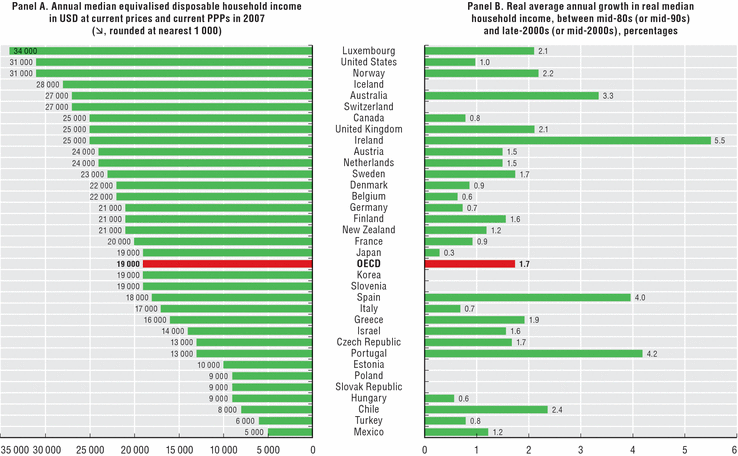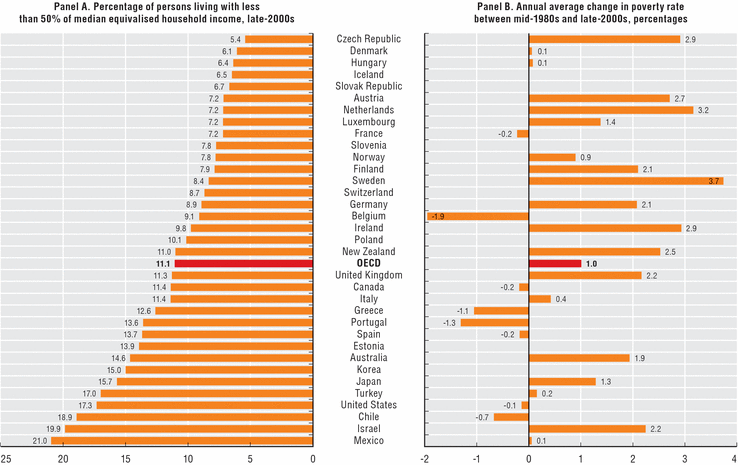To play devil's advocate, there are some parts you should've bolded in the article that you didn't.
Like this one:
Some conservatives say this measure, called absolute mobility, is a better gauge of opportunity. A Pew study found that 81 percent of Americans have higher incomes than their parents (after accounting for family size).
This is elaborated on in another article by Scott Winship, who was quoted in the OP article,
One way to assess the extent of mobility is to ask whether people tend to be better off than their parents were at the same age — whether they experience upward absolute mobility. Research for EMP conducted by my colleagues at the Brookings Institution Julia Isaacs, Isabel Sawhill, and Ron Haskins shows that two-thirds of 40-year-old Americans are in households with larger incomes than their parents had at the same age, even taking into account the fact that the cost of living has risen. That’s pretty impressive, but it actually understates the improvement between generations. Household size declined over these decades, so incomes now are divided up among fewer family members, leaving them better off than bigger households of the past. Another EMP study shows that when incomes are adjusted for household size, four out of five adults today are better off than their parents were at the same age.
The finding of pervasive upward absolute mobility flies in the face of liberal accounts of a stagnant middle class. These accounts generally conflate disappointing growth in men’s earnings with growth in household income, which has been impressive. Growth in women’s earnings has also been impressive, but economic pessimists have twisted these bright spots to fit a gloomy narrative. They claim that household incomes have kept pace only because wives have been forced into work to make up for the shrinking bacon their husbands bring home. That ignores the long-term trend of women’s obtaining more education in industrialized nations around the world, presumably with an intention to put it to use in the work force someday. It also ignores the evidence that married men rationally chose to reduce their work hours as their wives increased theirs (even as single men continued working the same hours), and the fact that employment grew more among the wives of better-educated men than among the wives of less-educated men.
Source:
http://www.nationalreview.com/articles/282292/mobility-impaired-scott-winship
You also forgot this part:
Even by measures of relative mobility, Middle America remains fluid. About 36 percent of Americans raised in the middle fifth move up as adults, while 23 percent stay on the same rung and 41 percent move down, according to Pew research. The “stickiness” appears at the top and bottom, as affluent families transmit their advantages and poor families stay trapped.
This fits nicely into a point I made in another thread: If you're the median household in the US, your disposable income (which remember does not take into account in-kind government transfers or consumption taxes) is at least as high as (often a good deal higher than) that of the median household in basically evey other country in the world. Even if you were to take into account in-kind gov. transfers and consumption taxes, I'm willing to bet the US would still rank pretty darn high in terms of median household disposable income.
On the other hand, if you pick a random household, its more likely to be poor, i.e. its disposable income is more likely to be less than 50% of the median household's disposable income, in the US than in essentially every other developed country. Of course, this measure of poverty is a bit controversial, since the richer the median household in the country is, the higher the poverty threshold, as well.
The data to support this:
There's another part that I found interesting, as well:
The income compression in rival countries may also make them seem more mobile. Reihan Salam, a writer for The Daily and National Review Online, has calculated that a Danish family can move from the 10th percentile to the 90th percentile with $45,000 of additional earnings, while an American family would need an additional $93,000.
"It's harder to get rich here than in freaking France and Denmark" partly because being a "rich" American family requires far more income than being a "rich" Danish one!
Last part. You only bolded two of the
seven possible causes for this lack of mobility. I've bolded the first five below:
The causes of America’s mobility problem are a topic of dispute — starting with the debates over poverty. The United States maintains a (1) thinner safety net than other rich countries, leaving more children vulnerable to debilitating hardships.
(2) Poor Americans are also more likely than foreign peers to grow up with single mothers. That places them at an elevated risk of experiencing poverty and related problems, a point frequently made by Mr. Santorum, who surged into contention in the Iowa caucuses. The United States also has (3) uniquely high incarceration rates, and a (4) longer history of racial stratification than its peers.
“The bottom fifth in the U.S. looks very different from the bottom fifth in other countries,” said Scott Winship, a researcher at the Brookings Institution, who wrote the article for National Review. “Poor Americans have to work their way up from a lower floor.”
A second distinguishing American trait is the (5) pay tilt toward educated workers. While in theory that could help poor children rise — good learners can become high earners — more often it favors the children of the educated and affluent, who have access to better schools and arrive in them more prepared to learn.
Causes
(2),
(4), and
(5) are very important in my opinion, as they highlight one of the potential solutions to this problem: supplementing the child-rearing resources of disadvantaged families through iniatives like the First Five Years Fund (
http://www.ffyf.org/). As clear from the initiative's name, the focus is on
early childhood education. Some videos about the iniative: 1.
http://www.youtube.com/watch?v=Eis-CLs6ds8 2.
http://www.youtube.com/watch?v=L8U96Q_x3qE 3.
http://www.youtube.com/watch?v=XSqA2dkPc_I 4.
http://www.youtube.com/watch?v=4SB8svwf5uk (James Heckman talks) 5.
http://www.youtube.com/watch?v=eAp1Q4ezAXY (another Heckman video).
I think it's critical to lessen the political influence of the economic elite and to fix the country's healthcare system (though not necessarily by copying the healthcare systems of other developed countries), but I don't think that doing so would by itself solve the country's poverty problem. Frankly, I think it would only reduce poverty by a minimal amount. Education reform is absolutely necessary, and we should give a high priority to early childhood education. Daron Acemoglu makes a similar point in this awesome interview:
If you’re looking at the average college graduate versus the average high school graduate, or the 90th versus the 10th percentile, then the things economists have emphasised – technology, globalisation, offshoring and outsourcing, changes in the supply of skills, et cetera – have played a major role and probably tell the bulk of the story. But if you want to understand the top inequality, why the top 0.1% – even more than what the 1% Occupy Wall Streeters are talking about – have been earning such huge amounts, then really you have to think about the social policy aspects of it and the politics of it.
...
[The Race between Education and Technology] is a really wonderful book. [It is a must-read for anyone interested in inequality.] It gives a masterful outline of the standard economic model, where earnings are proportional to contribution, or to productivity. It takes its cue from a phrase that the famous Dutch economist, Jan Tinbergen coined. The key idea is that technological changes often increase the demand for more skilled workers, so in order to keep inequality in check you need to have a steady increase in the supply of skilled workers in the economy. He called this “the race between education and technology”. If the race is won by technology, inequality tends to increase, if the race is won by education, inequality tends to decrease.
Source:
http://thebrowser.com/interviews/daron-acemoglu-on-inequality
In other words, reducing the political influence of the top 1% is important, but if you want to reduce the huge gap between the poor and middle class -- a goal that's much more important in my opinion -- then we need to make sure education wins the race against technology!


